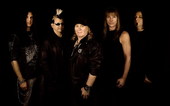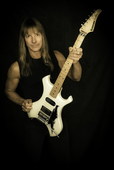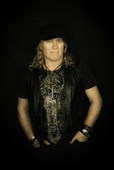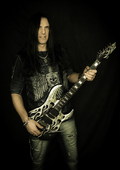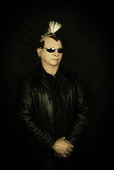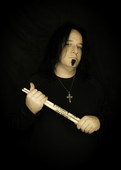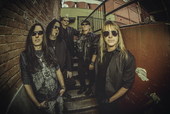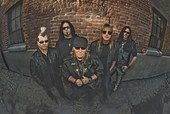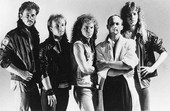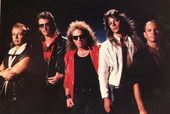Q5
Times Change, Tastes In Music Don’t
12.10.2016
Архив интервью | Русская версияThe hearts of many music lovers made a leap in spring 2016. It is very likely that it happened to everyone who remembers the name Q5. Back in the 80s, this Seattle-based band issued two outstanding albums that were warmly welcomed by the fans of classic U.S. heavy metal. Moreover, one of the band’s key members, Floyd Rose, made history of rock music by inventing a tremolo system that has been used on guitars widely ever since. However, it look the musicians about 30 years to open a new chapter of their story. It took a while to complete this interview as well – while yours truly was searching for contacts of a key band member, arranging a Transatlantic conversation via Skype, typing and editing it, spring has turned to autumn. Nevertheless, you will now k now what guitarist Rick Pierce has to say on what drove the band to reuniting, how Seattle metalheads survived the grunge wave, what role in the Q5 reunion was played by Italian label Frontiers Music, etc.
My first question will be very simple, as there is very little information on your band on Russian internet sites. What are the origins of the name Q5? What meaning did you want it to carry in the beginning, and what do you want it to represent now?
That’s a very good question, and it’s not very easy to answer. I think we originally liked the name Q5 because it didn’t mean anything. It would just mean whatever we were. It just sounded vaguely to us, and we all were fans of science fiction. A letter and a number seemed to us more like science fiction than a band name that would bring us its own meaning and its own shades of meaning. It really doesn’t mean anything except just the band.
The long-awaited album “New World Order” is finally coming out on July 8. Can you say a few words about it? Will it be as melodic as the previous Q5 records, or will it be closer to the more aggressive music that you have been doing with the band Nightshade? And what is the meaning of the album title?
The new album will be closer to the first Q5 album (“Steel The Light”, 1984). Although there are some very melodic songs, we used absolutely no keyboards on “New World Order”, it’s all guitars. I feel that we have some very melodic songs. There are 14 songs on the album, so there is a lot of variety of music, but it’s all guitars. The title “New World Order” refers to the dark future that Jonathan K. (vocals) foresees. He would probably be best qualified to explain his lyrics, but “new world order” is a dark future.
Rock music had always been synonymous with protest. In the 60s it was a protest against war, in the 70s and the first half of 80s, it was a protest against the philistinism and isolation. In the second half of that decade rock bands were protesting against that idiot Tipper Gore and so on... Throughout the decades, protest was a source of inspiration. Speaking about Q5, what were and are the sources of inspiration for your songwriting?
That’s a very complicated question, but a very astute one. I think that hard rock music is about power, and I don’t know if it has to protest any political ideas. I think it’s power, it’s feelings of youth, and positive energy. Especially when you’re in a big crowd, it unites in a positive energy of powerful music. To us it’s not political at all, in fact, it transcends politics. It’s our art, it’s our love of the music that brings us together –metalheads from anywhere, when they get together. I remember I went to Wacken in Germany around the year 2000, and in my home town, Seattle, it was very hard to find heavy music. I started wondering if I was ever going to see a good rock show again. I remember almost coming to tears… who was it that I heard? It was maybe Rose Tattoo, or Doro – I don’t remember who it was, but I almost came to tears hearing and seeing that many people all together for our kind of music.
We can currently see a resurgence of interest in the music you are playing: melodic hard rock and heavy metal. How do you assess the situation – is there a feeling of rebirth of the genre?
I believe that there is. What is telling me this is that we’re seeing younger fans, we’re seeing people that don’t just know us from our original albums. We’re seeing people, especially in Europe, coming to our gigs, that know our music, who are in their 20s. They’ve apparently been exposed to our music somehow and they’re listening to bands that we like, but I think the fact that there are young fans is a sign of resurgence. It’s not going to die off with our generation.
Q5 started almost 35 years ago. What has changed over the years, and how do you look at present-day realities? Was it difficult to raise the banner once again after all these years? There have been dramatic changes in the show business, principles of recording, distribution and even the listening culture…
Yes, there’ve been lots of changes. Boy, the music business has really changed a lot. You may or may not know, Dmitry, that three of us in the original Q5 were in a band before Q5 that also toured and recorded a lot. That was a band called TKO (when Jonathan K. and Floyd Rose were putting together Q5, they invited three TKO members – drummer Gary Thompson, bassist Evan Sheeley, and guitarist Rick Pierce, who was initially quite reluctant to join the new combo – ed.). That was our introduction to the music business as it was in the late 70s and the early 80s, and it was a much bigger business then than it is now. The realities have changed, but the heart of the music doesn’t. And I think that’s what remains constant. I don’t think our music has changed a lot although definitely the technology is new. When we started vinyl was all there was. We were recording in an era when CDs were the new technology, and record labels would put out CDs with multiple albums on it, just to get CDs out for their acts. In fact, in Europe our label Music For Nations put out both Q5 albums on one compact disc. It was two albums everywhere else in the world, but Music For Nations put out two albums on one disc. Now, of course, it’s downloads, but our first two albums have continued to sell ever since we put them online at iTunes and Amazon. The first two from the 80s continue to sell in a download format. So things change but tastes in music don’t necessarily change. At least ours hasn’t.
Our first album was done on a 24-track. During our second album Floyd, the other guitar player, was very much into the technology, and he was producing. He put a studio in his very large house, and while we were recording on a 24-track, we were one of the very first studios to mix down to ADATs, to mix down to a digital recording. After that, on Nightshade albums, we went from tape to ADAT and then to Pro-Tools, and that’s where we’re at now. We’re recording everything in the digital realm, and we’re mixing back to tape to get the old sound. The technology all changes, but the music stays the same.
There have been a lot of rumors and legends about the “third” album of Q5, which was recorded in 1987, but never released. Did any of this material end up in 1991on the album “Dead Of Night” by Nightshade? Especially as it was written on the front cover of that album that Nightshade are the successor of Q5.
(laughs) I have to laugh, because the record label, Music For Nations, didn’t tell us that they were going to do that on the cover. If this was an American album, they would have just maybe put a sticker that says, “Former members of Q5”, but they actually made a part of the cover that says “Formerly Q5”, because they were anxious to have us be considered the successors of Q5. But it is true that at least four of the songs on Nightshade’s “Dead Of Night” album were recorded for the third Q5 album. We recorded them over again though for Nightshade, but they were the same songs. Jeffrey, our drummer now, played drums on “Dead Of Night”, so we go that far back. We had a connection then, in 1991, we did our first record with Jeffrey on drums.
I think Jeffrey’s playing style is more progressive than Gary’s…
They’re both very good drummers. I think Gary’s style might have influenced Jeffrey, but they’re both excellent drummers. Gary is coming to our CD release party, when we play in Seattle in early July. It will be good to see him, we remain very close friends.
Talking about Q5, it’s impossible not to mention Floyd Rose, a legendary musician, inventor and a founding member. What is your relationship with him today? Is he still contributing to the band in any manner, musically or technically maybe?
Yes, he is. We’re on very friendly terms with Floyd. In fact, the way we got back together as the band Q5 happened because we were all playing in Nightshade, and Evan, our original bass player, came and played with Jonathan and I in Nightshade, and fans of Q5 noticed that with the three original members back together why don’t we just call it Q5. We said, “OK, that makes sense”, but to play Q5 material, especially from the first album, we needed two guitars. We were invited to play a large festival in Sweden in 2014, and at that time we would have continued being Nightshade, and we would have just done performances as Q5 with the full line-up, so we invited both Gary and Floyd to play with us, to actually reform the exact band. But neither Gary nor Floyd wanted to do that performance, to play live again. Gary still plays in a band called The Hallyards, but the style of music is different. Floyd still continues to write music, and he still works on his inventions for guitar, but he didn’t feel good about returning to playing on the level that we were at before. So Floyd declined to play with us, but he is interested in writing songs with us, and I still consult with him about technical aspects of recording and guitar. In fact, I got a new invention of his, which is an improvement of his tremolo bar attached to a Les Paul type guitar. I played a Les Paul a lot in Q5, and I still do, but I wanted to put a tremolo on a Les Paul, which means that it has to be cut a lot. It’s a lot of expensive work to put a Floyd Rose on a Les Paul guitar. But Floyd told me about his new tremolo that will attach to a Gibson or any other Les Paul that uses a standard bridge. He actually gave me a prototype of that in 2014, and I’m still using that. He’s still inventing things for guitar.
What about the Kramer guitar brand? Do you still play it?
(laughs) I do. That’s all I play still. I still am nursing along the guitars I got from Kramer in the 80s. There’s no substitute for my Night Swan. It’s been around the world with me, it’s been broken by airlines, it’s been lost and regained, and that’s still my main squeeze. You may not have seen the cover for “New World Order” yet, but when you do, you will see that I still have my Floyd Rose signature Kramer guitar in that picture. I still prefer Kramers, and I’m always watching eBay to see if I can find another Night Swan, because there’s nothing exactly like it. I told you about my Les Paul that Floyd gave me the tremolo for, so I do have a new Les Paul that I may take out with me with Floyd’s new tremolo on it, because before the Kramers I played mainly Les Pauls.
Floyd has been replaced by Dennis Turner. Could you tell me what he has brought to the band and how he joined the team?
Dennis is an excellent player and he brings more technical musical knowledge that I have, and he has a bigger technique, where I’m a little more in-your-face in my style. So I think we play off each other well. The connection with Dennis goes a long way back in that we have mutual friends in the band Metal Church: I did a tour with Metal Church’s singer Ronny Munroe, and Dennis is a good friend of Ronny. When I played with Ronny and toured with him, I also met Rick Van Zandt of Metal Church, who went to Sweden with us. Rick was the guitar player that went to Sweden with us for Sweden Rock, but he also knew Dennis very well - we’re in the same circle. In Ronny’s band I was playing at least one song that was written by Dennis, so I also knew that he was a good songwriter. We invited Dennis to come in and play with us, and we hit it off immediately, everybody in the band, all together, and we decided that was the line-up that night.
You said you’re big friends with Metal Church. Can you tell me about this friendship in more detail?
It actually goes very far way back for me. Kurdt and I in the very early days both were involved somewhat in the Seattle punk scene. I knew Kurdt from the time he was in the band called The Lewd, and I was in a band called Ze Whiz Kids, but that’s ancient history. More recently, I got to know Ronny Munroe just in the course of running into him on a road, and we formed a friendship and thought that we would work together. I joined Ronny’s solo project for a while, and also Rick Van Zandt was involved in that. Rick is still in Metal Church, but Ronny is starting his own band called Ronny Munroe’s Thunder. It was a great privilege for me to play some of that material that I was playing with Ronny. Kurdt wrote some great songs, and still does.
In addition to Dennis, there is another newcomer in the band: drummer Jeffrey McCormack. How did he become a Q5 member?
With Jeffrey, as I said, we go all the way back to the formation of Nightshade, which Jonathan and I formed after Q5 broke up. Jeffrey already knew our music and was a fan of Q5 back then, when we did the first Nightshade album, so it was almost automatic when we needed a drummer that we would talk to Jefferey. And he was very willing to do it. That was actually another kind of reunion: our drummer before that for many many years was my dear friend Frankie Rongo, but Frankie did not want to travel to the extent that we intend to now.
Is it true that Q5 were better received in Europe than in your home country in the 80s? If I'm not mistaken, the British magazine Kerrang! even gave "Steel The Light" the "album of the year" title.
(laughs) Yes, and I can’t help laughing about it, because there’s not much that we were doing in Europe at the time. Somebody pointed out that, I think, in 1986, “Steal The Light” was still on the album charts, and it had been on the charts for a year and a half, and we didn’t even realize that we were considered being very successful there when we didn’t even have an American record deal. “Steal The Light” was released in Canada on Atlantic, it was in Japan on Victor Records, it was in Europe on Music For Nations, but we didn’t have an American record deal. Our record in the United States was on our own label, Albatross Records. (laughs) When “Kerrang!” gave us “Album of the Year”, the local Seattle music newspaper gave us “Worst Cover of the Year”. We weren’t signed to a major American label until “When The Mirror Cracks”, and Squawk Records, which was distributed by Polygram, signed us for that.
Q5 come from Seattle. How did you survive the times when grunge was flourishing? What do you think about that type of music that came from your city and took over the world?
Oh boy… Those were not the good times. That was in the early 90s when we had changed over to Nightshade, but Jonathan and I were still writing music together – we actually never stopped. It was in Seattle, but I thought the whole world was going this way, that’s what I was telling you about going to Wacken – I didn’t realize that metalheads from all over the world could come together to enjoy the music. If you’re in Seattle, you’d think this could never happen, because when grunge was happening in Seattle, everybody changed overnight. All of a sudden guitar solos were out, singing was not done anymore, you had to grunt, I think… It was funny, too, because people that we knew, that we would do gigs in the months before - after Nirvana hit, they would all look different. People that used to have big hair got straight hair, they went from wearing denim and leather to wearing plad. I don’t think it was good for music at all, I can’t think of anything good about it, although I am friends with some bands that were very successful, and I have friends that were musicians back then, that I remain good friends with. But as far as living in Seattle and being in a metal band, it was a very hard time, and it was a sad time.
It’s common knowledge that Frontiers Records sign not only young and talented melodic rockers, but are also very active in bringing back cult melodic rock band from the 80s and 90s, such as King Kobra, Nelson, Lynch Mob, Stryper, etc. What was the role of Frontiers in the reunion of Q5?
They did seek us out, but we were already active in playing. We were putting the band back together, but very early on they expressed their interest in being the label to put out a new album. We’re honored to be on that label.
When the band reformed, did you plan the recording of “New World Order” from the beginning, or was the original plan just to revive old songs for live gigs?
When we got together we started jamming some new ideas that Jonathan and I had been working on. They really fit well, especially having two guitars now gave us a lot more freedom in what we could do for arrangements than we could when I was just playing guitar alone in Nightshade, It happened quite fast, and, in fact, this album came together amazingly fast. Both Q5 and Nightshade, we would take years to make an album. This album came together quite fast, and I think that everybody had so many ideas, all at once, and it was a very fast and organic creative process. The songs for the new album came together in less than a year – that may not seem fast to you, but to us that’s pretty fast.
You received a warm welcome in summer 2014 at the Sweden Rock festival, your gigs in Greece and Cyprus were also a success. What are your further touring plans? Would you like to play Russia?
Yes, yes! (laughs) We’re on the plane yesterday! We wanna play everywhere. We signed with an agent expressly to book us in Russia. We signed with Thomas Stahl, the booking agent, and he takes bands to Russia and Europe. We’re flying to Germany right after the release of our album, we’re going to play Headbangers Open Air Festival near Hamburg, that’s the festival we’ve done a couple of times in the past, and we’re open to expand from that and just keep playing for a while. We want to make up for the lost time.
Cover versions of Q5 songs have been recorded by such bands as Great White, Burning Point, Wolf… How do you like them? Don’t you think it’s time for a Q5 tribute album?
(laughs) Wow, that would be cool. I could think of no higher honor than to have a band want to cover your songs. All the covers I’ve heard, I really like, and some of them are humbling because they’re very good bands. I think that has always been a point of pride for Q5 at every stage of our playing careers and that’s the most important thing for any band: the whole reason we’re doing this is for the songs. That’s maybe one reason why our albums take so long to do. We love playing solos and we love showing off, but if it’s not for the song, it doesn’t mean anything. We’re really honored when other bands cover our music.
Q5 on Facebook: https://www.facebook.com/q5official
Special thanks to Jeffrey McCormack (Q5 drummer) for arranging this interview and for providing photos, and to Alexei Zavyalov for his help with putting together the questions
Interview by DeeKay
Translation assistance by Roman Patrashov
Photos by “Iron” Mike Savoia
May 29, 2016
© HeadBanger.ru
